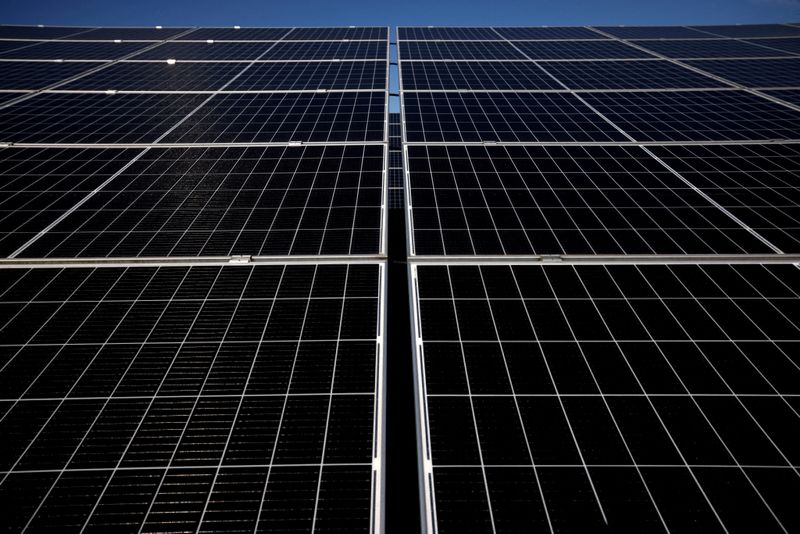By Riham Alkousaa
BERLIN (Reuters) - For months, Philip Matthias tried to convince his father to install solar panels on their company's roof in the eastern German state of Thuringia, aiming to cut electricity costs and carbon emissions at the metal products factory.
Initially sceptical of the 2.3-million-euro ($2.5 million) investment, a substantial sum for the medium-sized Tridelta, his father crunched the numbers and decided to nearly double the project capacity, opting to install photovoltaic modules that could power around 900 households in addition to the factory.
"The PV systems amortize after about 7-1/2 years. The manufacturer gives a guarantee of 20 years. That means this is an extremely lucrative investment," Matthias told Reuters.
Since the war in Ukraine and the sudden drop in Russia fossil fuel exports to Germany, Berlin has introduced laws to accelerate solar power expansion, part of its plan to cover 80% of the country's energy from renewables by 2030.
Encouraged by a feed-in tariff providing a guaranteed price to renewable energy producers selling their power, as well as reduced solar panel costs, German companies are increasingly turning to solar to get around high energy costs.
Although Germany has Europe's biggest capacity of solar and wind power generation, its small and medium-sized companies have yet to benefit from lower electricity prices because of high grid fees and taxes they must pay. By generating their own solar power, they avoid those fees and taxes.
Companies consumed around 69% of Germany's national electricity in 2023, data by the BDEW utilities association showed.
"As electricity prices in Germany show no signs of decreasing as previously anticipated, companies are increasingly recognising the economic viability of installing solar panels," said Marie-Theres Husken, an energy expert for the BVMW association for small- and medium-sized businesses.
CORPORATE SOLAR SHIFT
Newly installed photovoltaic capacity on business rooftops rose by 81% year-on-year in the first four months of the year, outpacing the 1% growth in the residential sector, data by the BSW solar power association shows.
A May survey by pollster YouGov showed more than half of German companies with suitable roofs planned to install solar power systems in the next three years. BVMW forecasts that nearly all manufacturing companies in Germany will use solar energy by 2030.
In response to increasing demand, Germany's largest residential solar power developer, Enpal, said in April it was expanding into the commercial sector.
"The demand was not as instant... but the growth is going to be very sustainable," Melchior Schulze Brock, CEO of commercial and industrial solar startup Enviria.
An April study by the Freiburg-based Institute for Applied Ecology showed there was potential to install up to 287 gigawatts (GW) of solar capacity, more than enough to meet Berlin's 2030 target of 215 GW, along German roads, railways, parking lots, and industrial areas. This could significantly reduce reliance on agricultural land where permitting and planning approvals can take up to a decade.
A drop in solar panel prices globally since last year has spurred companies to embrace solar energy.
"The market is overrun with cheap but good panels from China. That means that the system that we are building now is about 20% cheaper than a year ago," Matthias said.
A German legislative package passed in April easing regulation and increasing subsidies for large rooftop systems as well as a pending tax investment reform for real estate funds operating rooftop solar panels, is expected to drive demand further.
State feed-in subsidies for large scale rooftop photovoltaic projects, introduced in 2021 and which are selected via tender, have also boosted the trend.
The last tender for the subsidised projects in February saw a 107% rise in the number of offers year-on-year, data by the federal grid network agency showed.
A feed-in tariff of 9.3 euros cents per kilowatt-hour, higher than Tridelta's power purchasing price, makes it currently cheaper for the company to sell future generated electricity to the grid and buy it back, Matthias said.
Germany's economy ministry declined to comment on companies' electricity trading strategies.
"There's a high correlation between the feed-in tariffs and the build-up of solar PV roof top projects," Hugo Willink, Executive Director at solar roofs developer Sunrock told Reuters.

Sunrock, which won an order from Mercedes Benz (ETR:MBGn) in May to build a 23-megawatt solar project on the carmaker's factory roofs, sees Germany as its core market for the coming year.
($1 = 0.9334 euros)